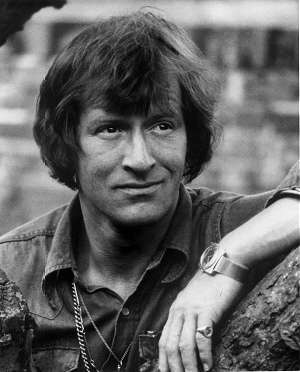
A full house
In his second article on the RSC season which
opens next month in Newcastle PETER MORTIMER talks to ALAN HOWARD - an actor
who thrives on hard work and the sort of artistic challenge which would make
lesser mortals quit.
|
By around 10.30 p.m. on Saturday, March 25, no
one, I'm sure, will complain if Alan Howard quietly collapses.
Not that he will. His stamina has not let him
down so far, and after Newcastle there's still London.
Howard undertakes one of the most remarkable
and strenuous challenges in the present RSC schedule. Taking the lead part in a
Shakespeare play is daunting enough for any actor. Howard takes five leads -
simultaneously.
He can be seen as Henry VI in the rarely seen
trilogy Henry VI, Parts I, II, and III, as Henry V, and also as
Coriolanus. Having seen him in the last role, and observed the energy and
passion he injects into the tragic Roman hero, I was left wondering how he can
switch so rapidly to the English monarchs.
A deeply committed actor, 40-year old Howard is
disarmingly modest about the pressures put upon him.
"You get used to it," he says, "people have to
adapt to things." |
 |
He has that distinctive foggy voice, a voice which at
times reminds one of a half-muffled circular saw; tall, well proportioned, and
with a definite "presence", his exceptional theatrical abilities make him an
obvious selection as one of the leading Shakespearean actors of his
day.
He has never been to drama school, and began his
career at the Belgrade Theatre, Coventry as a general stage assistant. At that
time he felt the top of his tree would be an assistant stage manager. Not
having been through the normal preparatory mill, he feels unsure about
influences on him, even about what "identity" he has reached.
"It keeps developing, you never actually arrive at an
identity."
When he first took on this awesome quintet, it meant
four consecutive first nights, which he found "awful". Henry VI ages from 15 -
50 in the three plays, and when they're done on consecutive nights, he says:
"You can actually feel yourself aging over the days, just naturally you're
getting older."
Cliffhangers
"But I do think the trilogy is great. No one has
performed it for almost a quarter of a century, anywhere. It starts off like a
cartoon strip, the French and English thumping hell out of each other, then it
turns inwards to the family feuding. Lots of cliffhangers......."
Away from Shakespeare for a lunchtime pint, Alan
Howard is most excited when talking about Shakespeare. He lives his work on
stage and off, and talks of the bard as being "remarkable."
"Because his characters aren't consistent, you can't
point to one and say, he's a good one, or he's a baddie, all sorts of conflicts
are going on."
"The theatre is about blood, brain, and balls, and
you show me anyone else who can bring them all together like he does."
Coriolanus is also rarely performed, yet it is
says Howard, one of Shakespeare's most political, and disturbing plays.
"It's very bleak, and rather than give us guidelines
it tends to throw it all into our lap. The tragedy in it is what's left behind,
and people find this difficult to take, it's not removed enough for them. It's
a remarkable play."
On stage, the black leather-clad Howard oozes a
violent, sexual nature, striding round the dark malevolent set, his words spat
out in half supressed fury.
"To do it in Newcastle will be really interesting.
Hardly anyone likes touring when it's one week jobs, but this is like a real
season, and unlike a tour, there's sure to be a feedback, which is
important."
"It is only when you have a confident company, as we
do now, that you do bold things like go to Newcastle for five weeks."
Others in the company talk with respect about
Howard's remarkable stamina. Few actors would tackle his work-load, yet he
turns it to sound almost like an advantage.
"The contrast between the roles can be an
inspiration. Also, having three plays for Henry VI gives time for an actor to
develop the part."
Shakespeare
Howard's generation of actors has undoubtedly brought
Shakespeare to a wider, less select audience. He himself talks about, "its
peculiar advantages."
"What I mean is that by watching good theatre we
often learn more in the real sense than through all the official processes. I
think being made aware of truths and values in this way is always superior to a
society where such things are imposed, where we are told by an authority. Give
a child a new toy, and he will play with it all day. People should be given new
toys, that's what real culture is about."
"And people criticise Shakespeare because he doesn't
always get his historical facts right. I say, so what? Look at his language,
look what else he offers."
After almost ninety minutes, there's the realisation
that we've talked almost exclusively about Shakespeare, and little about Alan
Howard.
As the conventional interview goes, very little of
the required ground has been covered. You could say we know not much about the
man. Except I feel we know a great deal.
Peter Mortimer.
The Newcastle Journal, 19.1.1978.

